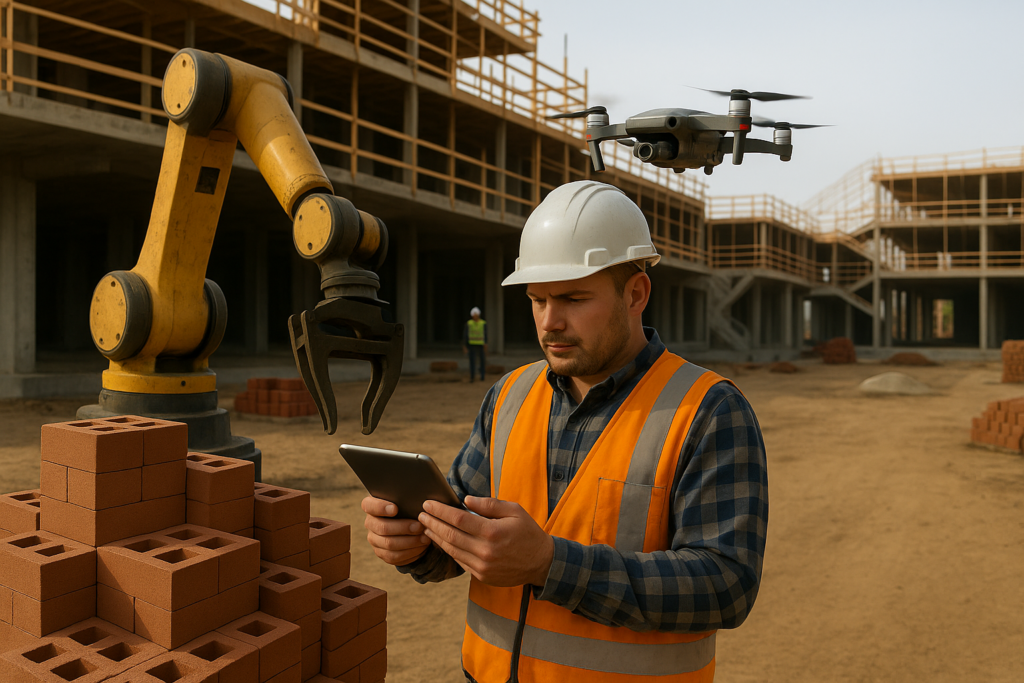Artificial Intelligence (AI) is reshaping the construction industry by optimizing project management, improving risk assessment, and enabling predictive analytics. These advancements are driving efficiency, reducing costs, and empowering decision-makers with insights previously unattainable. Here’s how AI is revolutionizing construction:
1. Project Planning and Scheduling
AI streamlines the complex task of planning construction projects by automating scheduling and resource allocation.
Automated Scheduling: AI algorithms analyze historical data and project parameters to generate accurate schedules.
Dynamic Adjustments: Real-time data from construction sites enables AI to adjust timelines and resource needs proactively.
Scenario Planning: AI tools simulate various project scenarios, helping managers identify the most efficient strategies.
Use Case: A general contractor uses AI-powered scheduling software to optimize labor deployment, cutting project delays by 15%.
2. Risk Assessment
Construction projects face numerous risks, from budget overruns to safety hazards. AI excels in identifying and mitigating these risks.
Risk Prediction: Machine learning models analyze historical project data to predict potential issues, such as cost escalations or contractor delays.
Safety Monitoring: AI processes data from IoT sensors and cameras on job sites to detect unsafe conditions or behaviors.
Compliance Assurance: AI ensures adherence to building codes and regulatory standards, reducing legal risks.
Use Case: A large infrastructure project uses AI to predict potential weather-related delays, enabling preemptive scheduling changes that save $500,000.
3. Predictive Analytics
AI’s ability to process vast amounts of data enables construction teams to foresee issues and make data-driven decisions.
Cost Forecasting: AI analyzes material prices, labor costs, and market trends to provide accurate cost projections.
Equipment Maintenance: Predictive analytics monitors machinery performance, scheduling maintenance before breakdowns occur.
Performance Insights: AI evaluates productivity metrics, helping managers identify inefficiencies and optimize workflows.
Use Case: A contractor leverages predictive analytics to anticipate supply chain disruptions, ensuring materials are sourced on time and under budget.
4. Enhancing Design Processes
AI supports architects and engineers by improving design workflows and outcomes.
Generative Design: AI creates multiple design options based on constraints like budget, materials, and space requirements.
Clash Detection: AI integrated with Building Information Modeling (BIM) identifies design conflicts before construction begins.
Sustainability Optimization: AI evaluates energy efficiency and environmental impact, enabling greener construction practices.
Use Case: An architectural firm uses AI to generate optimized building layouts, reducing material waste by 20%.
Benefits of AI in Construction
Increased Efficiency: Automating time-intensive tasks reduces project timelines.
Cost Savings: Accurate forecasts and optimized resource use minimize waste and overruns.
Enhanced Safety: Real-time monitoring and predictive tools reduce accidents.
Better Decision-Making: Data-driven insights improve project outcomes.
Challenges
Data Quality: AI depends on clean, comprehensive datasets to function effectively.
Adoption Costs: Initial investment in AI technologies and training can be significant.
Resistance to Change: Industry professionals may be hesitant to adopt new tools and workflows.
Future of AI in Construction
The integration of AI with emerging technologies such as drones, robotics, and augmented reality will further transform the industry. For example, drones equipped with AI can monitor construction progress, while AI-powered robots can perform repetitive tasks like bricklaying. As AI continues to evolve, it will become a cornerstone of construction innovation, enabling projects that are safer, faster, and more sustainable. Embracing AI is not just an advantage—it’s a necessity for the future of construction.
D.R. McNatty & Associates, Inc. (DRMcNatty) is well-positioned to assist organizations in leveraging AI-driven advancements in construction project management and design. With over three decades of expertise in project controls, software implementation, and managed cloud solutions, the company provides tailored strategies to optimize efficiency and data-driven decision-making. By integrating AI-powered tools with Oracle Primavera Unifier, Primavera P6, and other industry-leading platforms, DRMcNatty enhances predictive analytics, risk assessment, and automated workflows, ensuring seamless project execution. Our approach mitigates data sprawl by consolidating disparate information sources, enabling real-time collaboration and improved governance. Additionally, our expertise in compliance tracking, financial management, and lifecycle tracking ensures that AI-driven solutions align with regulatory requirements and organizational goals. Through customized training, implementation support, and strategic consulting, DRMcNatty empowers construction firms to harness AI for enhanced productivity, cost control, and long-term project success.







